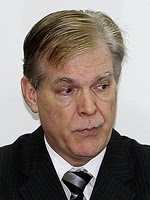Intellectual Property Watch, 27 October 2010
Ministers Arrive To Help Reach Outcome At UN Convention On Biodiversity
By Catherine Saez @ 6:14 pmAs ministers arrived in Nagoya, Japan, for the high-level segment of the UN Convention on Biological Diversity today, negotiators kept trying to reach consensus on remaining agenda items, such as a strategic plan, or an international legal instrument to prevent biopiracy and ensure the fair and equitable sharing of benefits accrued from the use of genetic resources.
Ministers gave interventions on 27 October, the first day of the high level segment of the 10th CBD Convention of the Parties (COP). Most ministers attending COP are ministers of environment. There are 193 members of the CBD.
Ministers called for a successful outcome of the negotiations on what most of them described as the three main issues of the convention: the adoption of a 2011-2020 biodiversity strategic plan, an agreement on a new strategy for resource mobilisation, and the adoption of an international treaty on access and benefit sharing (ABS).
The Informal Consultative Group negotiating the draft protocol meanwhile resumed its negotiations and provided yet another draft text today, available here. The previous draft was from 26 October (IPW, Biodiversity/Genetic Resources/Biotech, 26 October 2010).
A number of developing country ministers presented initiatives taken in their country to protect biodiversity and insisted on the importance of a legally binding ABS protocol with a strong compliance mechanism.
The minister of Mexico, speaking on behalf of the Group of Latin American and the Caribbean countries, said it was “imperative” to conclude a meaningful, ambitious protocol on ABS, with an effective compliance regime. The minister of Namibia said that to date, nothing was being done to ensure benefit sharing and the importance of benefit sharing should not be underestimated.
“The time for talking is over,” said Izabella Teixeira, minister of the environment of Brazil. “It is time for providing answers. We are all tired of endless meetings which just postpone the solutions for the problems,” she said. An ABS protocol to the CBD is “fundamental to overcome the implementation deficit of the convention and to combat biopiracy,” she said.
Indonesia said that the ABS protocol should provide legal certainty to avoid biopiracy, and Sri Lanka said that the country was a major victim of biopiracy and that the ABS negotiations were a key element of the convention.
South Africa called for a legally binding instrument with a balanced approach between access, benefit sharing and compliance. The minister said there was a need for a strong compliance mechanism with possible sanctions.
The chair of the session asked ministers to encourage the delegates to work hard toward the success of the negotiations.
A number of developed countries presented the financial contributions that they had or will be contributing to the protection of biodiversity, in particular in developing countries. But despite the importance of the issue, none mentioned compliance relating to the ABS protocol.
The European Union said that a spirit of cooperation was shown throughout the negotiations but “hard work” was still ahead to find consensus on the key priorities. The EU said that they had come to the negotiations with a full mandate to conclude work on the ABS protocol but to achieve a meaningful protocol, there was a need for a common willingness to compromise.
A significant protocol on ABS is essential, said the minister of Luxembourg, while Sweden said that it was now “high time” to adopt the ABS protocol. Canada called for a reasonable and transparent protocol which balances obligations of users and providers of genetic resources.
The United States, which is not a party to the CBD but was permitted to speak, said that science should have an increased role in decision-making, and Portugal said a fair agreement on ABS was in order to fulfil the goals of the CBD but considerable concessions needed to be done.
During a press briefing today, Ahmed Djoghlaf, CBD executive secretary, said that out of 54 decisions in the CBD negotiations that countries had to agree on, over 28 were adopted. He said that the high level segment was planned at the end of the convention to engage policymakers.
CBD Needs to Raise Its Profile, Group Finds
Separately, on 25 October, the Union of Ethical BioTrade (UEBT) presented a special edition of its Biodiversity Barometer adding two Asian countries – South Korea and Japan – to its previous version. The barometer aims at showing the levels of awareness of biodiversity and related purchasing attitudes in a set of countries.
The survey showed that only 32 percent of Japanese and 48 percent of South Koreans had heard of the CBD, numbers similar to those found in Europe and the US.
Catherine Saez may be reached at csaez@ip-watch.ch.

Nenhum comentário:
Postar um comentário